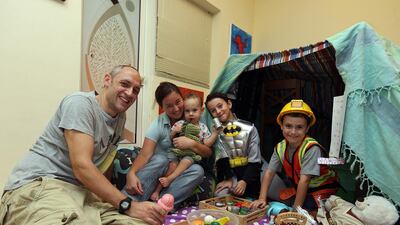For parents spending the summer in the UAE, TVs and tablets can be a blessing and a curse.
Although the gadgets have their benefits (a peaceful house with quiet children), wrestling the gadgets from the kids to stop them turning into zombies can result in excessive whining – unless you have a firm plan in place for alternative activities.
Dr Madeleine Portwood, consultant psychologist at Dubai-based specialist training and capacity building consultancy Ebdaah, says parents need to make sure time spent on gadgets remains a treat during the holidays, rather than becoming the mainstay of a child’s day.
“Too much screen-time stops children developing physical skills, reduces the time they engage in imaginative play, reinforces inappropriate behaviour and restricts language abilities. Only through books and social interactions can a child be immersed in rich and descriptive language.”
So how can parents get through the holiday period without resorting to long bouts of tech-time?
At the start of Ramadan last year, mother of three, Becky Kett, 32, was suffering pangs of guilt for plugging her sons, Wynn, 6 and Angus, 7, into the family’s iPad for about an hour a day, while she looked after her youngest son, Arlow, who is now 16 months.
“Time spent on the iPad was spiralling out of control and it was becoming the default thing to do. We wanted to be more intentional about how much screen time they got.”
By international standards, the time the Kett kids spent on electronic gadgets every day wasn’t excessive. Children between the ages of 5 and 16 now spend an average of six and a half hours a day in front of a screen, according to research released two months ago by British market-research firm Childwise.
“We just felt it was too much,” says Becky. “They were on it as soon as they got up in the morning, and it set a tone for the day.”
Becky and her husband, John, both teachers from the United Kingdom who live in Mirdiff, decided an action plan was called for to stop technology from taking over the school holidays.
“We drew up a timetable each week and asked the boys to write a bucket list of activities they would like to do – like Kidzania and Ski Dubai,” says Becky. “We did those activities every Wednesday to break the week up, using Entertainer and Time Out vouchers to make it cheaper. Mirdiff mums Facebook page was great for connecting with other families. We’d arrange play dates around each other’s houses once a week.”
To burn off some energy, Becky and John took the kids to the beach at 6.30am every morning for an hour. At home, they rationed screen time to 20 minutes a day during the hottest part of the day.
The rest of their day was divided into independent, screen-free play and interactive time between parents and kids – usually a board game or a memory game, which Portwood recommends.
“Young children spend far too much time in isolated pursuits with iPads and computer games,” says the psychologist. “This significantly impairs social and communication skills and children have poorer language skills on entry to full-time education. Children love to have the attention of parents, and games that encourage social communication are developing skills for the future. Activities can include simple games such as Snap or I Spy.” After restricting the use of gadgets, last summer ended up being one of the best holidays the Kett family had ever had.
“It can be hard to wean your kids off the screen,” says Becky, “but not if you are organised and proactive about it.
“We’ve always tried to instil in the boys that they don’t need fancy toys to play. They can build a tent or do some drawing and still be creative. The hardest thing as a parent is letting them make a mess. You have to try to look past that and think ‘Oh well, they’re having fun, we’ll tidy up later’.”
artslife@thenational.ae

